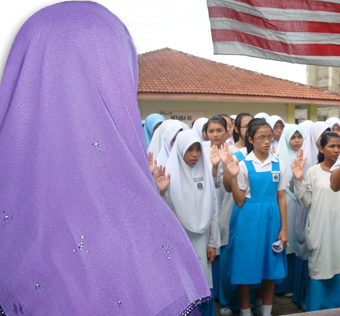By Shazeera Ahmad Zawawi @ Loyar Burok
Considering the lack of consideration for the rights of the child in the recent case of the pork lunch meal caning.
On November 5th 2010, a mother complained to the Sarawak Education Department that her son was caned by his teacher for bringing pork to school. As you notice (of which I hope you do), I did not mention the religious or ethnic background of the boy at all. There are two reasons why I left out those layers of fact.
Ebony, ivory, living together in harmony
First, I felt sick with how recently our Statesman, bureaucrats or politicians are missing the plot to this sad incident. The Minister in the Prime Minister’s Department, Datuk Seri Mohamed Nazri Abdul Aziz for example, call for an investigation of the boy’s religious status before conclusions can be drawn on why he was caned. Our independent Parliamentarian, Zulkifli Nordin utilized this issue against PAS and got into an unnecessary argument with Dr. Zulkifly Ahmad, another Parliamentarian from the Islamic Party. Apparently, the righteous fight and egoistical call to defend Islam trumps a poor child’s “wrong” selection of lunch meal.
Secondly, the issue turned into a cliche religious debate albeit the fact that the real concern is not so much about the boy’s religious status but why he was even caned in the first place. Is it in the best interest of the boy as a child, to be caned, whipped or spanked over his private choice of lunch? The Disciplinary Guidelines for Headmasters and Teachers 1988 clearly spelled the procedures for corporal punishment in school. It clearly indicates how caning is not a disciplinary action that can be undertaken by just any teacher. Specific power is given to the headmaster to execute the punishment and the requirements for delegation of power to cane was also expressed in the Guideline. In other words, caning in school is supposed to be exercised with due care and caution.
On top of that realisation, I attended the National Consultation to Review the School Disciplinary Regulations organized by the Ministry of Education in my former capacity as an officer with the Human Rights Commission of Malaysia a few years ago. There were extensive discussions on the use of corporal punishment against children in school by educators, parents and civil society during the consultation. The strong justification for such use to be continued is due to the argument that children nowadays are difficult to control and discipline.
Reflecting on those enlightening discussions I had during the consultation, I wonder now whether bringing pork to school would amount to being difficult and undisciplined. Even more worrying is whether our present educators are capable of assessing a school offence objectively without succumbing to their own personal values and bias?
In discussing the use of corporal punishment in school, it is important for us to revisit our human rights commitment where child rights are concerned. When Malaysia ratified the Convention on the Rights of the Child in November 1995, it accepts fully the provisions of Article 28 (2) that details the approach to disciplinary measures in school. The Article states that;
States Parties shall take all appropriate measures to ensure that school discipline is administered in a manner consistent with the child’s human dignity and in conformity with the present Convention.
 Corporal punishment is obviously inconsistent with human rights principles. Since the consultation I attended and with this latest incident further eroding my trust and confidence in our education system, I wonder whether we can see a more progressive change to the school disciplinary regulations in Malaysia that puts a child’s interest and well being as its primary consideration.
Corporal punishment is obviously inconsistent with human rights principles. Since the consultation I attended and with this latest incident further eroding my trust and confidence in our education system, I wonder whether we can see a more progressive change to the school disciplinary regulations in Malaysia that puts a child’s interest and well being as its primary consideration.
This issue is not a mere case of a religiously dysfunctional family’s controversial choice of meat. It also exposes how our education system handles the questions of personal choices in a heterogeneous society. Should we resort to force and imposing ideals every time we catch a person committing something that is in conflict with our own personal beliefs and choices? What happened to human compassion and respect?
I completely understand why the incident is stirring hostility from many sectors but as we attempt to make sense of the issue using our set of experiences, fears, prejudices and limited understandings, we forget that the real victim here is the little boy. Not only was he caned for bringing to school a lunch meal that was prepared by his mother, his religious status and private life is now open to public probe.
I am a firm believer that as a Muslim, using physical force against a child or accusing an Islamic Party for allowing the sin of eating pork to be committed by other fellow Muslims will not resolve anything. If we seriously have concerns with how our Muslim brothers or sisters behave, wouldn’t showing love and respect counts as an effective step to reconcile our differences or hostilities? Isn’t that what Islam is all about?
Shazeera is back in school. She will be in the Cold and Distant Land of York for a year pursuing her MA in Applied Human Rights. Despite that, she still detests PERKASA and misses the political drama in Malaysia. Courtesy of Hornbill Unleashed



No comments:
Post a Comment
Note: Only a member of this blog may post a comment.